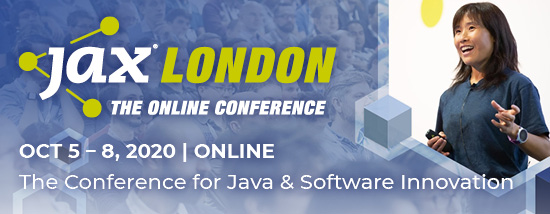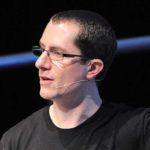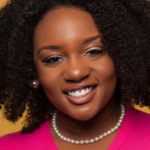A research study by The National Center for Women & Information Technology showed that “gender diversity has specific benefits in technology settings,” which could explain why tech companies have started to invest in initiatives that aim to boost the number of female applicants, recruit them in a more effective way, retain them for longer, and give them the opportunity to advance. But is it enough?
Four years ago, we launched a diversity series aimed at bringing the most inspirational and powerful women in the tech scene to your attention. Today, we’d like you to meet Kate Sills, Lead Software Engineer at Agoric.
Today’s Woman in Tech: Kate Sills, Lead Software Engineer at Agoric
Kate Sills is a Lead Software Engineer at Agoric, a JavaScript-native smart contract platform and PoS blockchain. Kate leads the development of Agoric’s smart contract framework, which is called Zoe. With an interest in economics and law, she has been a columnist for the Cato Institute and was previously a board member of the Tezos Commons Foundation. She graduated from the University of California at Berkeley with a degree in Computer Science.
is a Lead Software Engineer at Agoric, a JavaScript-native smart contract platform and PoS blockchain. Kate leads the development of Agoric’s smart contract framework, which is called Zoe. With an interest in economics and law, she has been a columnist for the Cato Institute and was previously a board member of the Tezos Commons Foundation. She graduated from the University of California at Berkeley with a degree in Computer Science.
When did you become interested in technology?
My dad is a farmer, but he also wrote computer programs for the family farm, mostly land-leveling programs in MS-DOS, that would figure out where to take dirt and move it most efficiently to level a field for the right slope. When I was about eight, I saw him working and asked if I could do it too. I wrote a few programs: one that played Mary Had A Little Lamb using computer tones and another that was a choose-your-own-adventure text-based game. But after that, I pretty much stopped programming, because I couldn’t see a direct application in my life. I did a little bit of blogging with a modified WordPress install, but I didn’t do any intensive programming outside of my own website until college.
How did you end up in your career path? What obstacles did you have to overcome?
I always thought that I would be a lawyer, actually. As embarrassing as it is to admit, I did LSAT logic games for fun. Also, the idea of working for justice really appealed to me. But when I was in college around 2010 or so, there was a lot of press about the day-to-day experience of being a junior lawyer and the high levels of depression and alcoholism in the industry. I didn’t like the idea of being in a very hierarchical structure trying to make Partner in a law firm or dealing with a deeply dysfunctional legal system for the rest of my life.
At the time, I was a Cognitive Science major at UC Berkeley, which meant I could take classes in philosophy, psychology, linguistics, neuroscience, and computer science. Very late in my time at UC Berkeley, I added Computer Science as a second major. I took a very heavy course load to catch up on classes. Everyone at college was very encouraging. I would say the major obstacle was just continuously having to deal with wrongly lowered expectations from my new classmates in each class, but sometimes it was quite fun to surprise people.
Did you receive support from your family and friends? Do you have a role model?
My family and friends have always been hugely supportive, even if my family’s advice is sometimes disconnected from the tech industry. For instance, my dad once told me that I probably wanted a Windows laptop for school, because when he was programming, only the artsy people had Macs.
Growing up, I didn’t really have any good role models in tech that were women. And I don’t think Mulan counts, although that was hugely influential. Today, there are many women that I look up to. For example, Adrienne Porter Felt, who is a Director of Engineering at Google, has been a great example of a woman in tech and has great sci-fi book recommendations on Goodreads to boot.
Did someone ever try to stop you from learning and advancing in your professional life?
No, I don’t think anyone has tried to stop me from learning or advancing. I think the major obstacle is that unfortunately, whether through sexism or merely the human mind interpreting statistics and base rates, people don’t generally expect an individual young woman to be noteworthy or a power player. So you have to be used to people either ignoring you or approaching you at a conference because they’re interested in dating, rather than seeing you as a potential investor or business partner. To be fair, I’ve had many great experiences just being able to connect with people at conferences based on what I’m working on, but I’ve also had days when I have had a number of bad experiences in a row. On those occasions, the support that I get from coworkers and friends is really helpful, but at the same time, I think you just have to have a strong belief in your own value, regardless of any external evaluations.
I think you just have to have a strong belief in your own value, regardless of any external evaluations.
A day in Kate’s life
I work at Agoric, a JavaScript-native smart contract platform, and Proof-of-Stake blockchain. Agoric’s composable smart contract development environment provides reusable governance, lending, and trading components to propel the creators of the multi-chain DeFi economy.
I’m the lead software engineer on Agoric’s smart contract framework, which is called Zoe. Zoe is the linchpin for secure and efficient smart contract development. Outside the walled garden of Ethereum, using Zoe smart contracts enables the fluid exchange of digital assets in a multi-chain economy.
A typical workday, now that we’re remote as a company, is joining Zoom to sync up with my coworkers for the day, then either building a new feature for Zoe, or reviewing my coworker’s code, or preparing for some kind of talk or demo. I try to make time for some sort of exercise during the day, usually indoor rock climbing or yoga before or after work.
What are you most proud of in your career?
I’m really proud of the design of Zoe, Agoric’s smart contract framework. I took a general specification from Mark Miller, our Chief Scientist at Agoric, and Dean Tribble, our CEO, and turned the general concept into an API that people could actually use.
Zoe handles all of the escrowing of assets for users of smart contracts so that the smart contracts themselves don’t handle the assets. This means that it’s much safer for a user to engage with smart contracts. If the smart contract has a bug, the damage is limited, and the user is guaranteed to get their assets back or get what they wanted. For example, let’s say the contract is an auction contract. If that contract is written incorrectly, or it has a bug, the wrong person might win the auction, but Zoe will guarantee that all the bidders either get the item that was auctioned, or they get their money back.
This is a huge step forward to bring smart contracts to a mainstream audience. Developers of smart contracts can experiment rapidly, knowing that users and their assets are safe.
Why aren’t there more women in tech? What’s your take on that?
Interestingly, there were more women majoring in computer science in 1984 than when I was in college, although I think the numbers have improved since then. People have noticed that the drop correlates with the rise of personal computers and specifically, computer games targeted mostly to men and boys, and not women.
This explanation makes a lot of sense to me, and it matches my own experience. I was interested in programming when it seemed like I could easily make something. My own little brother was modding his video games, but I didn’t really play video games because I wasn’t very interested in the type of first-person shooters and racing games he was playing. So I wasn’t interested in programming after I started at age eight because I didn’t have any real-life applications for it. I read a lot, so if I had instead been surrounded by something like Ink (a platform for programming narrative-based games), my experience would have been really different.
When I started college, a lot of my classmates had years more experience than I did with programming. But, I loved how UC Berkeley teaches computer science because it helped to level the playing field. They focused on the timeless academic aspects of computer science rather than the day-to-day industry requirements. That meant that in the first computer science class that everyone takes at Cal, they taught Scheme, a dialect of Lisp, which was as foreign to my classmates as it was to me. And while my classmates had to unlearn all the bad habits they had collected, I could focus on learning Lisp without any preconceived ideas about how it should work.
So I think if more women worked in STEM, there would no longer be a huge gap between men and women in terms of their casual access to opportunities through networks.
Could you name a few challenges (or obstacles) women in tech face?
It’s a lot harder without a group of close friends who are interested in the same things. As a woman, I didn’t have any friends growing up who knew about programming, so I lacked the kind of peer group that my male classmates in college started with. That kind of peer group is invaluable for working on programming homework problems, or after graduation, having industry contracts. So I think it’s important for women who major in computer science to have a number of male friends who are also in computer science who they can depend on for support and information.
Would our world be different if more women worked in STEM? What would be the (social, economic, and cultural) impact?
I think people don’t realize how much knowledge is currently conveyed outside of the normal channels, and how many of those opportunities are not available to women. I only recently realized this when I was talking to a high-powered woman who founded a startup. She was very short on time, and while we were talking, we both realized that neither of us had gotten haircuts in months. So we continued the conversation while getting haircuts, which sounds very silly, but it was a way to fit in a conversation that wouldn’t otherwise have happened. I’m only guessing, but I think this kind of thing happens all the time to men in business, in a way that isn’t very accessible or comfortable to women. For example, there’s the well-known old-school way of doing business: playing golf. That’s not something I’m interested in. And it’s really common for a bunch of programmers at a tech conference to share an Airbnb, or go get drinks one-on-one. There are a number of networking opportunities that are easier for men, just because it’s mostly other men involved.
So I think if more women worked in STEM, there would no longer be a huge gap between men and women in terms of their casual access to opportunities through networks.
The discussion about diversity is gaining momentum. How long will it take to see results from the current debate?
I’m not sure. It might depend entirely on a generation of women growing up with easy access to programming, and a compelling reason to do it. But one thing is really promising: on the internet and especially in blockchain, no one has to know you’re a woman. So frankly, I love the idea that the blockchain space and remote work can create an environment where you only reveal your gender if you want to. You could build amazing things and change history under a pseudonym, just like Satoshi.
What advice (and tips) would you give to women who want a tech career? What should they know about this industry?
Find something that you really love, that you have a passion for. I really loved the upper-division algorithms class at UC Berkeley, because it was essentially puzzle solving, but puzzle-solving in a way that could change industries, like Google did to search engines.
Find objective measures of your own success and hold onto them. One thing that really helped me was the objective feedback of homework and exams in college: code worked or it didn’t. And that was true regardless of whether I was a minority. That meant that other people’s opinions didn’t matter to my success. I didn’t have to work to fix their expectations or wear hoodies to fit in; I was good at what I was doing and I had proof. The real world is of course messier. You can be right and coworkers still won’t listen or have a great idea and no VC will invest. But for me, it helps tremendously to focus on objective measures, like code having a vulnerability or not.
Lastly, find people who are supportive and who respect your contributions, not as a token, but as a person.
More Women in Tech:
- Women in Tech: Susanna Lawson, CEO and Co-founder of OneFile
- Women in Tech: Richa Dhandhania, Head of Analytics, Raisin DS
- Women in Tech: Miriam Bressan, Manager Solution Engineering, Global Accounts in CEMEA and SEMEA at VMware Tanzu
- Women in Tech: Abigail Ramlogan, Marketing product evangelist at NetBrain
- Women in Tech: Anna Stoilova, Co-founder & Chief Product Officer at TIKI
For even more Women in Tech, click here
The post Women in Tech: “Find objective measures of your own success” appeared first on JAXenter.
Source : JAXenter




















